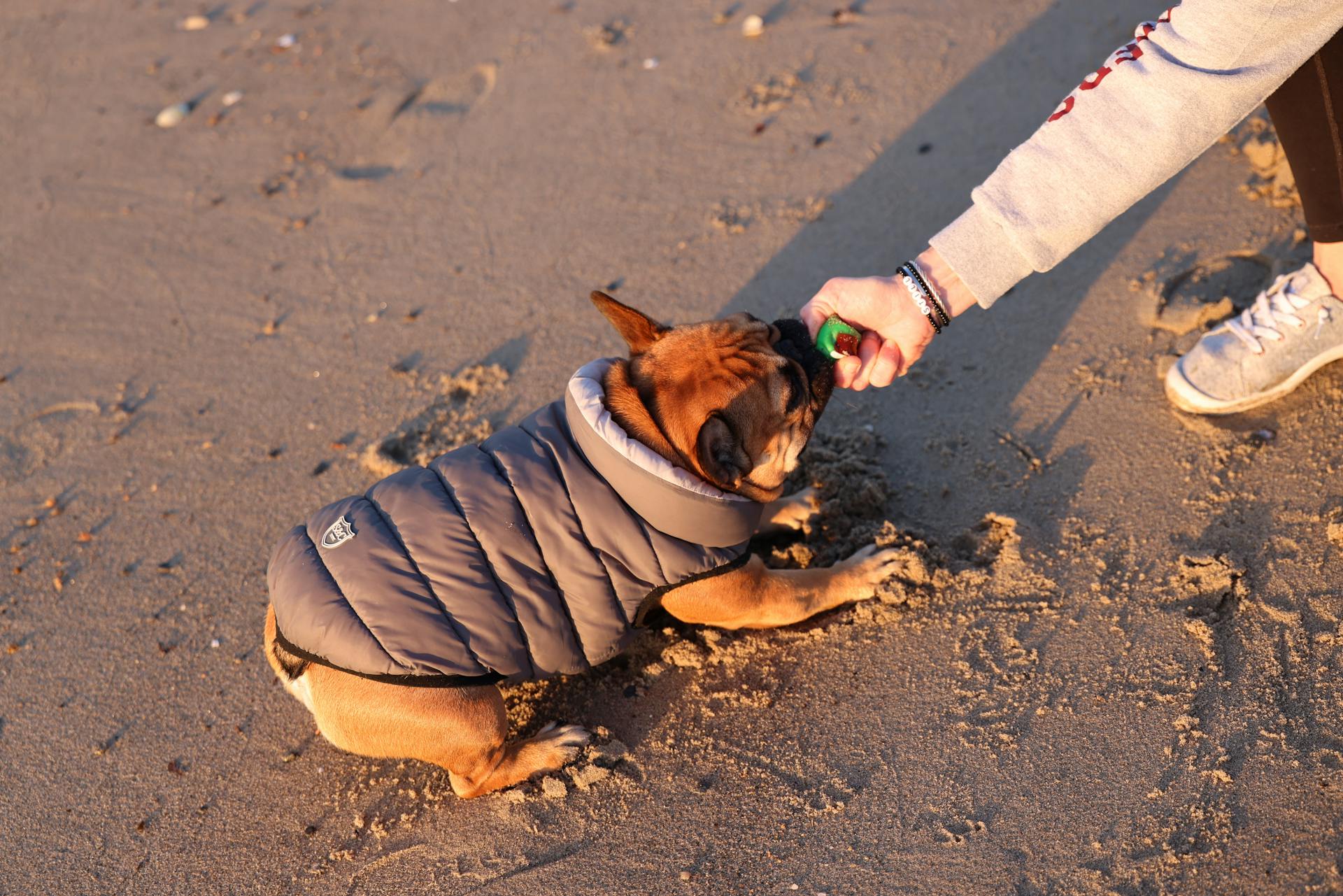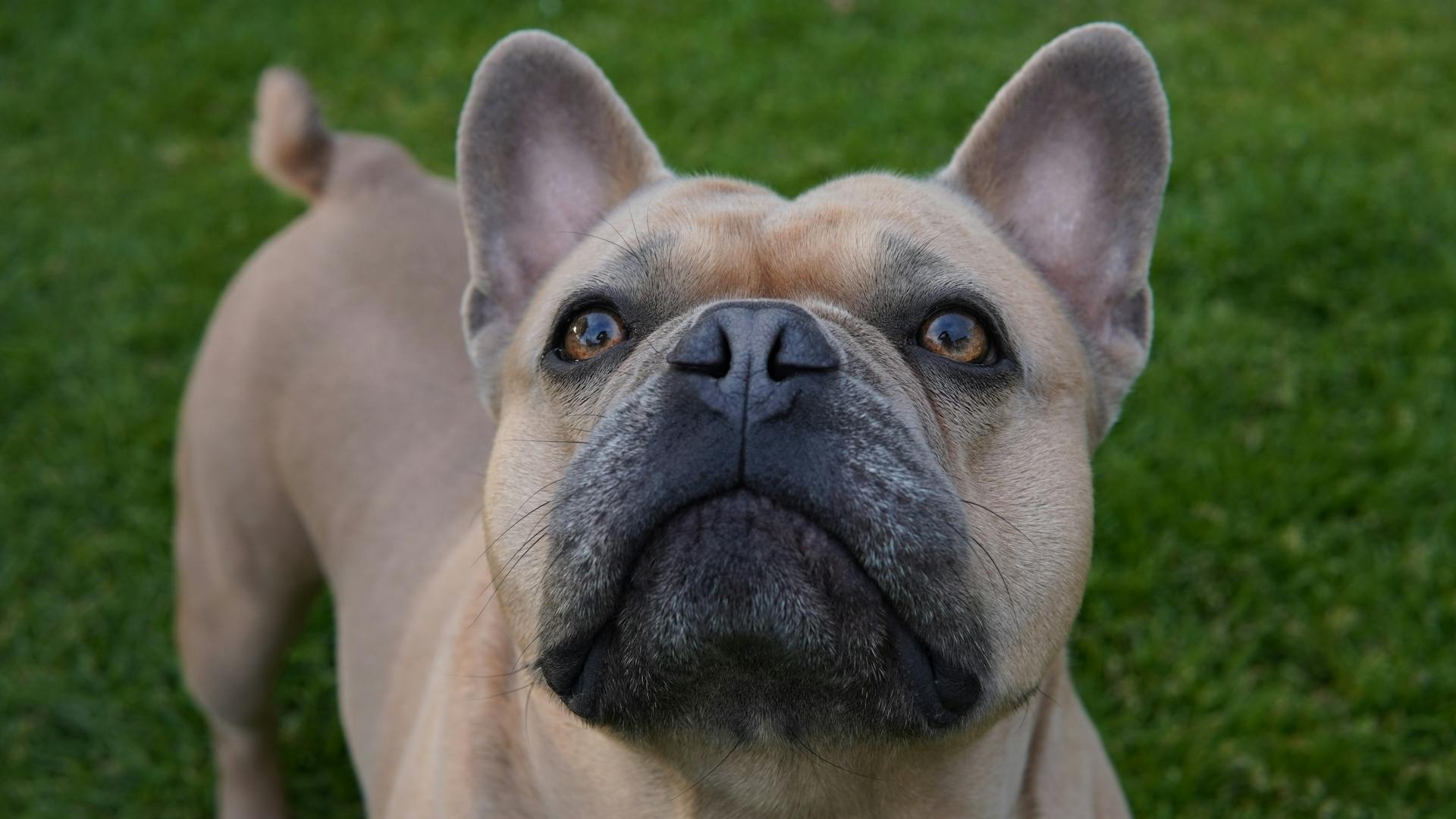
French Bulldogs are prone to obesity, with a study showing that 40% of French Bulldogs in the US are overweight or obese.
This is largely due to their brachycephalic skull structure, which can lead to breathing difficulties and make exercise challenging.
As a result, French Bulldogs require a balanced diet and regular exercise to maintain a healthy weight.
French Bulldogs need at least 30 minutes of exercise per day to stay healthy, but this can be as simple as a short walk or playtime in the yard.
A diet rich in protein and low in fillers is essential for maintaining a healthy weight in French Bulldogs.
Explore further: Healthy English Bulldog
Understanding Healthy Weight
A healthy weight for a French Bulldog is crucial for their overall health, and it can vary dramatically based on their size and gender. For example, a male French Bulldog can weigh between 20 to 28 pounds, while a female can weigh between 16 to 24 pounds.
To determine if your French Bulldog is at a healthy weight, you can check their body condition by feeling their ribs, spine, and hips. If you're not sure, consult with your veterinarian for guidance.
Regular veterinary check-ups are vital for accurately determining if your French Bulldog is overweight, and your vet can assess your dog's weight relative to breed-specific health standards.
Here are the ideal weights for French Bulldogs, based on their size and gender:
By maintaining a healthy weight, your French Bulldog can enjoy shinier coats, increased energy, healthier digestion, and improved overall health.
What Is Healthy Body Condition?
A healthy body condition for a French Bulldog is crucial to their overall health.
Their weight can vary dramatically based on their size and gender, with males ranging from 20 to 28 pounds and females from 16 to 24 pounds.
It's essential to consider their height, as some of that weight might be muscle, and males tend to be stockier than females.
Get Vet Checkups Regularly
Regular vet checkups are essential for monitoring your French Bulldog's weight and overall health. A vet can assess your dog's weight relative to breed-specific health standards and provide guidance on the ideal weight your dog should maintain.
If you suspect something is up with your dog's health, don't hesitate to visit your vet. They can help determine if excessive weight gain is caused by a more serious illness or health issue.
Your vet knows your Frenchie's health better than anyone, so it's best to consult with them for personalized advice on diet and exercise. They can recommend the best brand and portion sizes specifically for your pup.
Regular veterinary check-ups are vital for accurately determining if your French Bulldog is overweight, and your vet can offer valuable advice on diet adjustments and exercise routines. They can also monitor any weight-related health issues.
Explore further: English Bulldog Vet
Identifying Weight Issues
Identifying weight issues in your French Bulldog is crucial to ensure their overall health and wellbeing. You can tell if your Frenchie is overweight by checking their chest and abdomen with your fingers.
If you can't feel their ribcage, but instead feel fatty flesh, it's a sign that your dog may be carrying extra weight. Their chest should always be wider than their abdomen, if not, it's a sign of being an unhealthy weight.
Visible fat rolls, not just normal Frenchie wrinkles, can also indicate weight issues. Excessive panting, even when your dog hasn't been exercising or is in a cool environment, is another sign that they may be carrying too much weight.
Here are some key physical signs to look out for:
- You can't feel their ribs
- You can't see their waistline
- They get tired easily, don't want to exercise, or have difficulty moving
- Shortness of breath & heavy panting with mild exercise
- Visible fat rolls (not just normal Frenchie wrinkles)
A round belly that sways side to side when your Frenchie walks is a sign that they may be carrying too much weight. Difficulty moving, such as having trouble climbing stairs or jumping up onto furniture, is also a sign of weight issues.
A veterinary check-up is the most accurate way to assess your dog's weight in relation to breed, size, and overall health.
Causes of Weight Gain
French Bulldogs can easily gain weight due to a variety of factors. As cute as they are, French Bulldogs can gain weight due to overfeeding.
Not knowing how much to feed your French Bulldog is a common issue, and it's likely you might be overfeeding them if you're unsure. Overfeeding is a major cause of weight gain in French Bulldogs.
French Bulldogs find it hard to self-regulate their eating, making them prone to overindulging in food. This can lead to them eating way beyond what they're meant to, resulting in weight gain and related health issues.
Overfeeding
Overfeeding is a common cause of weight gain in French Bulldogs. It's easy to overestimate how much food your Frenchie needs, especially since they love to eat.
Their small body frame and slower metabolism mean they require fewer calories than larger breeds. Feeding your Frenchie too much food can lead to weight gain.
As owners, we need to be careful not to overindulge our Frenchies, as they can easily become overweight. Control what your Frenchie eats with two meals a day and limited portions that don't go over their daily calorie recommendations.
Explore further: Dog Food for French Bulldogs with Allergies
Not knowing how much to feed your Frenchie can be a problem, and it's likely you might be overfeeding them if you're unsure. Make sure someone isn't sneaking them extra food behind your back.
Frenchies have a tendency to focus on food and eat way beyond what they need to. To avoid this, stick to a diet formulated specifically for French Bulldogs and consult your vet for advice on safe and healthy treats.
Accurate measurement of food portions is crucial for effective weight management in French Bulldogs. Use a standard measuring cup or a kitchen scale to measure out their food and adhere to the feeding guidelines provided on the dog food label.
Genetics
Genetics play a significant role in weight gain, as some breeds, like the French Bulldog, are genetically predisposed to gaining weight, making it more challenging for them to maintain a healthy weight.
This means that even with proper diet and exercise, some dogs may still struggle with weight gain due to their genetic makeup.
Helping Your Dog Lose Weight
To determine if your French Bulldog is overweight, look for key physical signs such as a lack of visible waist when viewed from above and difficulty feeling their ribs easily under a layer of fat.
Regular weighing sessions can help you keep your Frenchie on target. Weighing a fat Frenchie is actually quite easy: weigh yourself on the scales first, then pick your dog up and weigh yourself again. The difference in weight is what your overweight Frenchie comes in at.
Consider home-cooked dog food instead of store-bought dog food, which can be high in calories and may not be the best option for weight loss. By preparing your Frenchie's food at home, you can control portion sizes and reduce the overall calorie intake.
To help your Frenchie lose weight, feed them lighter dog food with less calories, higher in fiber, and more protein. A general rule of thumb is to feed your Frenchie no more than 25 calories per pound of body weight.
You might enjoy: What to Feed French Bulldogs

Here are some tips for keeping your Frenchie active:
- Play with toys, such as fetch or tug-of-war
- Go for daily walks, aiming for 3-4 walks per day for at least 15 minutes
Remember to consult with your veterinarian before making any major changes to your Frenchie's diet or exercise routine. They will know the best brand and portion sizes specifically for your pup and can help you create a personalized weight loss plan.
They Can't Groom or Scratch Themselves
Helping your dog lose weight can be a challenge, but it's crucial for their health and well-being. French Bulldogs are prone to obesity, which can lead to a range of problems.
They are unable to groom and scratch themselves as easily as they used to. This is often due to weight gain, which can cause flexibility issues.
If your dog is struggling to scratch and groom themselves, it could be a sign that they've put on too much weight. Frenchies can still lick and scratch some areas, but certain parts of their body may be harder to reach.
Obesity can cause a range of health problems in French Bulldogs, so it's essential to keep a close eye on their weight and adjust their diet accordingly.
How to Help My Dog Lose Weight
Helping your dog lose weight requires a multi-faceted approach that involves diet, exercise, and monitoring their progress. Consulting with a veterinarian is essential to determine the best course of action for your dog.
Dietary changes can significantly impact your dog's weight loss journey. Consider home-cooked dog food instead of store-bought dog food, which can be high in calories and lacking in essential nutrients. A balanced diet that's rich in fiber can help keep your dog feeling full and satisfied.
Exercise is also crucial for weight loss in dogs. Aim for multiple short walks throughout the day, as well as play sessions that don't overexert your dog. The exact amount of exercise will depend on your dog's current health status and fitness level.
Monitoring your dog's hunger is also essential during weight loss. Feeding them smaller, more frequent meals can help manage hunger, and high-fiber foods can increase the feeling of fullness. Avoid giving in to begging, as this can disrupt the weight loss plan.
Treats can be a part of your dog's weight loss diet, but they should be low-calorie and healthy options, such as small pieces of carrots or apples. Avoid high-fat and high-calorie commercial treats.
Accurate measurement of food portions is crucial for effective weight management in dogs. Use a standard measuring cup or a kitchen scale to measure out their food, and adhere to the feeding guidelines provided on the dog food label.
Here's a quick guide to checking your dog's weight:
- Apply a small amount of pressure to your dog's chest.
- Using your fingers, check to see if you can easily feel their ribcage.
- If you cannot feel ribs, but instead fatty flesh, it could be an indication that your dog is overweight.
- Your dog's chest should always be wider than their abdomen, if not, it's a sign of being an unhealthy weight.
Regular check-ups with your veterinarian are essential to monitor your dog's progress and make any necessary adjustments to their diet and exercise plan. If your dog is not losing weight despite diet and exercise, it's essential to consult with a veterinarian to rule out any underlying health issues.
Exercise and Physical Activity
French Bulldogs need regular exercise to maintain a healthy weight and overall health. A common misconception is that they're lazy dogs who don't need much exercise, but that's not true.
They can't walk long distances, especially in the heat, but they do need regular exercise. I try to walk my Frenchie twice a day, each time taking up around 30 minutes, which is probably why my dog is very trim and muscular.
Playtime is also essential, and my Frenchie loves to play fetch or tug-of-war. In fact, the general recommendation is for 3-4 walks per day for at least 15 minutes, but anything is better than nothing.
Here are some tips for getting your Frenchie to exercise regularly:
- Play with toys, like fetch or tug-of-war
- Go for daily walks, aiming for 3-4 walks per day for at least 15 minutes
Consistency is key, and regular exercise not only aids in weight loss but also benefits their overall well-being.
Easily Tired and Overexerted
French Bulldogs get tired and overexerted easily, especially when overweight. They may become breathless after heavy activity, and if they're overweight, this can happen even after just a tiny amount of activity.
Overweight Frenchies will start panting or having to stop after a very short walk. You might notice your Frenchie is unable to climb up steps and stairs like they did before.

This is a clear sign that your Frenchie needs to lose weight. If you notice your fat Frenchie getting tired when they really shouldn't be, talk with your vet about developing diet and fitness plans.
It's essential to recognize the signs that your Frenchie is overweight, such as excessive panting, even in a cool environment. Difficulty moving, like having trouble climbing stairs or jumping up onto furniture, is another indicator.
An overly rounded belly that sways side to side when your Frenchie walks is a sign that they may be carrying too much weight.
Lack of Exercise
French Bulldogs are notorious for being couch potatoes, but they still need regular exercise to maintain a healthy weight. A lack of physical activity can cause weight gain and other health problems.
Frenchies will often become breathless after heavy activity, but when overweight, this will be noticeable after just a tiny amount of activity. Overweight Frenchies will start panting or having to stop after a very short walk.

You should aim for multiple short walks throughout the day and play sessions that don’t overexert your dog. The exact amount of exercise will depend on your dog’s current health status and fitness level.
Frenchies are prone to putting on weight easily, so it's essential to monitor their activity levels and diet closely. Excessive panting, difficulty moving, and a round belly are common indicators that your Frenchie may be carrying extra weight.
Here are some general exercise guidelines for French Bulldogs:
- Go for daily walks— the general recommendation for dogs is 3–4 walks per day for at least 15 minutes
- Play with toys— my Frenchie loves to play fetch or tug-of-war
Consistency is key, and regular exercise not only aids in weight loss but also benefits their overall well-being.
Regular Exercise and Walks
Regular exercise is essential for French Bulldogs to maintain a healthy weight and overall well-being. They need regular exercise, but it's a common misconception that they don't need a lot of exercise.
Frenchies can't walk long distances, particularly in the heat, but they do need regular exercise. Aim for multiple short walks throughout the day and play sessions that don't overexert your dog. The exact amount of exercise will depend on your dog's current health status and fitness level.

Here's a general guideline for daily walks: 3-4 walks per day for at least 15 minutes. However, anything is better than nothing! Don't overdo it! You can also play with toys, like fetch or tug-of-war, to get your Frenchie moving.
To keep your Frenchie engaged and motivated during walks, consider bringing along toys or treats. Playing fetch or other games can also help them burn more calories and build muscle. Always keep your Frenchie on a leash during walks and avoid busy streets or areas with heavy traffic.
A safe and healthy rate of weight loss is approximately 1-2% of their total body weight per week. Patience is key, as gradual weight loss is safer and more sustainable. Regular veterinary check-ups can help monitor progress and ensure that the weight loss plan is appropriate and effective.
Here's a rough estimate of your Frenchie's daily calorie needs: 25 calories for every pound they weigh. For example, if your Frenchie weighs 25 pounds, they may only need 625 calories a day.
Monitoring and Maintaining
Monitoring and Maintaining your French Bulldog's weight is crucial to prevent obesity.
Treats are a significant contributor to weight gain in dogs, so it's essential to monitor and limit their treat intake.
Choose healthy, low-calorie treats to reward your French Bulldog, and consider using a portion of their daily kibble allowance as treats.
This helps control the overall calorie intake.
Training treats should be small and not overly fatty or sugary.
Using fruits and vegetables like apple slices, blueberries, or carrot sticks as treats is a great alternative, provided they are safe for dogs.
A unique perspective: Homemade Treats for French Bulldogs
Diet and Nutrition
To get your French Bulldog on the path to a healthy weight, start by taking a closer look at their diet. PetMD recommends cutting food intake by 25 percent, which can make a big difference in their weight loss journey.
A consistent feeding schedule is key to regulating your French Bulldog's metabolism and aiding in weight loss. Set specific times for meals and stick to them to control portions and prevent overeating.
Measuring your dog's food is crucial to ensure they're receiving the correct amount. Use a standard measuring cup or kitchen scale to measure out their food, and adhere to the feeding guidelines provided on the dog food label.
Reducing portions is one of the simplest and most effective ways to help your French Bulldog lose weight. Start by measuring out their food with a measuring cup or kitchen scale, and follow the feeding guidelines on the packaging of their dog food.
Treats can be a challenge when it comes to weight loss, but they don't have to be completely eliminated. Choose low-calorie, healthy options like small pieces of carrots or apples, and limit the quantity to no more than 10% of their daily calorie intake.
A safe and healthy rate of weight loss for your French Bulldog is approximately 1-2% of their total body weight per week. This may seem slow, but it's a more sustainable approach to weight loss and can help prevent health complications.
Reducing carbohydrates in your French Bulldog's diet can also help with weight loss. Opt for dog food that is lower in carbohydrates and higher in protein, and choose healthier, low-carb alternatives for treats.
Health Risks and Concerns
French Bulldogs are prone to breathing difficulties due to their brachycephalic nature, which can be exacerbated by excess weight. This can lead to serious health issues.
Rapid weight loss can be dangerous for French Bulldogs, so aim for a gradual and steady reduction in weight. Regular check-ins with a veterinarian are essential to ensure the weight loss plan is safe and effective for your dog's specific health needs.
Excessive panting, difficulty moving, and an overly rounded belly are common indicators that your French Bulldog may be carrying too much weight. These signs can be a sign of a more serious health issue, such as joint pain or respiratory problems.
Regular Veterinary Check-Ups
Regular veterinary check-ups are vital for accurately determining if your French Bulldog is overweight.
A veterinarian can assess your dog's weight relative to breed-specific health standards and provide guidance on the ideal weight your dog should maintain.
Regular check-ins with a veterinarian are essential to ensure the weight loss plan is safe and effective for your dog's specific health needs.
French Bulldogs are prone to breathing difficulties and joint problems, so excessive weight can exacerbate these issues.
Rapid weight loss can be dangerous, so aim for a gradual and steady reduction in weight.
In some cases, excessive weight gain could be caused by a more serious illness or health issue.
Get regular checkups at the vet if you suspect something is up.
By being aware of the physical and behavioral signs of being overweight and understanding the related health risks, you can take the necessary steps to ensure your French Bulldog maintains a healthy weight.
Regular visits to the vet are essential in this journey, providing professional insights and tailored advice to keep your beloved companion healthy and happy.
Intriguing read: Why Are French Bulldogs so Popular
Health Risks
French Bulldogs are prone to joint pain due to their brachycephalic nature.
Rapid weight loss can be dangerous for French Bulldogs, so aim for a gradual and steady reduction in weight.
Their exercise regimen should be carefully monitored to avoid respiratory distress, as excessive weight can exacerbate breathing difficulties.

If your French Bulldog is overweight, they're at a much higher risk of developing serious medical conditions, including joint pain, respiratory problems, heart disease, and diabetes.
Here are some common health risks associated with excess weight in French Bulldogs:
• Joint pain
• Respiratory problems
• Heart disease
• Diabetes
Regular veterinary check-ups are vital for accurately determining if your French Bulldog is overweight, as a veterinarian can assess your dog's weight relative to breed-specific health standards and provide guidance on the ideal weight your dog should maintain.
Their compact build and playful personalities make them prone to weight gain, which can lead to various health issues, so it's crucial for French Bulldog owners to recognize the signs that their furry friend might need to lose weight.
Dog Supplement Safety
French Bulldogs are prone to obesity, so it's essential to approach weight loss supplements with caution. Many supplements have not been proven effective and could be harmful.
Before giving your French Bulldog any weight loss supplements, consult with your vet first. They can recommend safe and appropriate options or suggest dietary adjustments and exercise routines that can effectively help your dog lose weight.
A balanced diet and regular exercise are the safest and most effective ways to achieve weight loss for French Bulldogs.
Frequently Asked Questions
How big is too big for a French Bulldog?
For a French Bulldog, a weight above 30 pounds is generally considered too big, as it may indicate health issues. If your Frenchie exceeds this weight, consult a veterinarian to ensure their well-being.
Sources
- https://frenchbulldogowner.com/fat-french-bulldog-overweight/
- https://www.frenchiewiki.com/blog/ideal-weight/
- https://tomkingskennel.com/fat-french-bulldog/
- https://iheartdogs.com/how-to-help-a-french-bulldog-lose-weight/
- https://medium.com/@kauserarif456/the-vital-role-of-a-balanced-diet-for-french-bulldogs-well-being-e809a79eb49b
Featured Images: pexels.com


